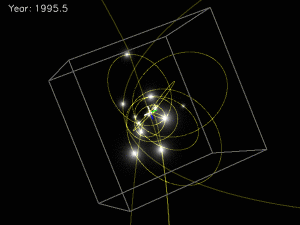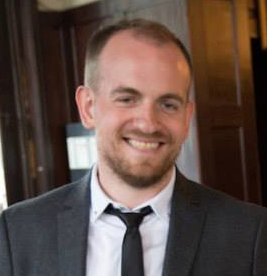Donnacha works on Weak Lensing and the combination of different probes from DES and beyond to make the best measurements we possibly can. He is interested, of course, in understanding dark energy, but also testing gravity on cosmic scales and using DES to try to measure the mass of the neutrino.
We asked Donnacha a few more questions – here’s what he had to say:
What is your favorite part about being a scientist?
Being a scientist you constantly get to learn new things. We hope some of those new things are the results of our own research but, along the way, you need to give yourself the “tools” you need to do the work you want to do. These tools are often ideas – bits of mathematics and statistics, and it is very satisfying to feel you have mastered something new that can help you do something new. Science, particularly cosmology, is very collaborative and it is great fun working with a whole range of people, united in the goal of saying something truthful about the Universe.
When did you know you wanted to be a scientist?
It was something I was interested in from a very young age, maybe 7 or 8 years old.
I was, and still am, really into science fiction – watching Star Trek, Doctor Who, Star Wars and reading Asimov, Arthur C. Clarke and Frank Herbert. It was this exposure to physics, real and imagined, that put me on the course to becoming a working scientist.
As I got older I also became interested in the history of science and reading a lot of popular science books and histories was a great way to satisfy my curiosity for new physics that I wasn’t yet studying at school.
I should also say that I never thought I wanted to be *only* a scientist. I have always been interested in literature, theatre, history, politics and philosophy. Specialisation is necessary in the modern world but it is a shame when science and scientists turn their back on the rest of human intellectual endeavour. Keeping a wide range of interests is very important.
 What is your favorite space-related image, and why?
What is your favorite space-related image, and why?
It shows real observations of stars in the centre of our galaxy as they move with time. We can tell from their motions that they are orbiting something very massive but we cannot see anything there.
The reason is that the massive object is the black hole at the centre of our galaxy. So much of modern cosmology involves talking about things we can’t see directly, this is a lovely example of how we measure their effects.
What is your favorite book, movie, and/or TV show?
Book: At Swim Two Birds by Flann O’Brien
O’Brien loved to play games with his books and this book is perhaps the link between the modernism of Joyce and a post-modernism that never really flowered in Ireland. It’s also really funny. Impecunious writers, bored devils and mythic heroes battle a grumpy and all powerful author.
If you weren’t a scientist, what would your dream job be?
Lottery winner.
What do you think has been the most exciting advance in physics / astronomy in the last 10 years?
Weak Gravitational Lensing! I would say that wouldn’t I? The slow steady progress towards being able to do real cosmology from measuring the shapes of tiny faint galaxies *is* very impressive though. I hope DES will catapult us into a whole new league.
I suppose the Planck CMB experiment is quite impressive too…
What do you think has been the most exciting advance in science / technology in the last 10 years?
Life expectancy for someone with AIDS has improved by 20 years over the last decade. This is a pretty incredible example of what can happen by slow, incremental improvements in medical care, even in the absence of a “miracle cure”. Of course this is for someone in the West, with healthcare and early diagnosis. There’s still plenty more to do.
Any advice for aspiring scientists?
Study what you’re interested in, whether in or out of school.
Read a lot. About science but also about other things.
To some extent you have to get “put in a box” – it’s important to have a specialism that you can claim expertise in and do well, but remember there’s also lots of life outside…
